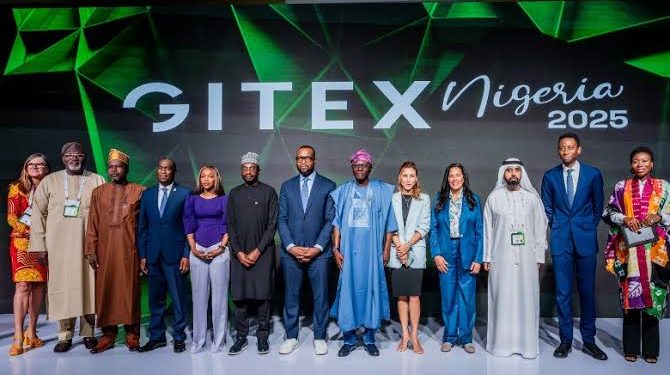Nigeria has taken a historic leap in its digital transformation journey by hosting its own edition of the Gulf Information Technology Exhibition (GITEX), one of the world’s most prestigious technology gatherings. After more than a decade of active participation in GITEX events across Dubai, Marrakech, and Berlin, the country has now brought the global showcase to its own soil.
The international technology exhibition, which opened in Abuja this week, marked a significant milestone for Nigeria’s innovation ecosystem. It drew government leaders, policy makers, global investors, startups, and technology giants into a single platform aimed at fostering collaboration, driving innovation, and cementing Nigeria’s position as Africa’s leading technology hub.
Speaking at the Lagos session of GITEX Nigeria, the state governor announced that Lagos alone has attracted more than \$6 billion in direct foreign investment into its technology startup sector between 2019 and 2024. He described the development as evidence that Lagos is not just a local economic powerhouse but Africa’s innovation capital. According to him, more than 70 percent of Nigeria’s total tech inflows now pass through Lagos, and the city has nurtured over 70 percent of Africa’s unicorns.
The governor highlighted Lagos’ transformation into a vibrant digital ecosystem, underpinned by hyperscale data centres, submarine cables, and a fibre connectivity grid spanning the state. He linked the success story to visionary planning that began decades ago, crediting early adoption of technology systems as the foundation of today’s digital progress.
He pointed to the city’s Blue Line rail system, now two years in operation and powered by the Cowry Card, a unified payment solution built by young Lagos innovators. The card integrates payments across rail, buses, taxis, and waterways. According to him, this model proves that homegrown solutions can power large-scale public infrastructure efficiently.
The governor stressed that Lagos’ governance model is now digital, inclusive, and data-driven. Through platforms such as the Lagos Digital Service Platform, citizens access healthcare, transportation, and other civic services seamlessly. He also noted that Lagos has maintained a Science and Research Fund for over six years, supporting startups with grants between ₦50 million and ₦80 million, some of which have gone on to design exhibition spaces at GITEX Nigeria itself.
In his remarks, the Minister of Communications, Innovation and Digital Economy underscored Nigeria’s broader digital ambitions. He explained that the ICT sector, which contributed less than 5 percent to GDP a decade ago, now consistently contributes 16 to 18 percent, with projections to reach 21 percent by 2027. He described Nigeria not just as a market but as a global innovation and creative force, powered by talent, infrastructure, and cultural influence.
He pointed to the Nigerian Stock Exchange where technology companies have overtaken oil firms as top performers, reflecting a structural shift in the economy. The minister also emphasized Nigeria’s cultural dominance, noting Nollywood’s global reach and Afrobeats’ success in filling stadiums worldwide. This fusion of creativity and technology, he said, defines Nigeria’s unique innovation story.
To support this growth, the government is rolling out transformative projects such as Project BRIDGE, a 90,000-kilometre fibre backbone to connect every ward in Nigeria, and the 3MTT initiative, which he described as the largest coordinated digital skills programme in the world. He also announced the upcoming launch of landmark legislation—the National Digital Economy and E-Governance Bills—to strengthen trust, security, and accountability in Nigeria’s digital space.
The Executive Vice President of Dubai World Trade Centre and CEO of KAOUN, who co-organises GITEX globally, hailed Nigeria as a beacon of resilience and ingenuity. She observed that unlike Silicon Valley, Nigerian startups innovate not merely out of ambition but out of necessity, which drives them to scale faster and endure longer. She described Lagos as a “mega high-speed test bed” for technology, noting that products that survive Lagos can thrive anywhere in the world.
She revealed that this inaugural GITEX Nigeria attracted more than 650 startups, 200 investors, and participants from over 40 countries. She urged entrepreneurs not to be discouraged if immediate funding did not materialize, noting that the long-term value lies in connections, insights, and positioning for global markets.
GITEX Nigeria signals more than just the launch of a new exhibition. It represents a movement that positions Nigeria as the leading technology and innovation hub in Africa. With government support, private investment, and a vibrant youth-driven ecosystem, Nigeria is no longer only participating in the global tech race—it is shaping it.
The message emerging from Abuja and Lagos is clear: the future is not on the horizon, it is already here, and it is proudly Nigerian.










